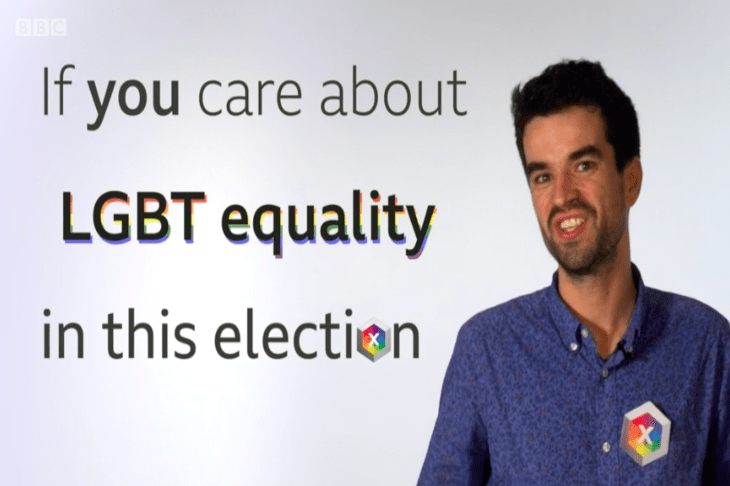In my latest book, ‘The Madness of Crowds’ (copies of which can be found in all remaining [not remainder] bookstores, etc) I mentioned in passing that I sometimes wondered how it feels to be a heterosexual reading the news these days.
That feeling wafted past me again over the weekend as I went to the front page of the BBC News website and came across a video titled ‘General Election 2019: What to look out for on LGBT issues’.
The video is presented with positively boastful impartiality by a BBC journalist called Tobias Chapple who wears a charming form of blue nail polish. The camera often lingers on this, as though to prove to us that what we are watching is a truly queer production.
Anyhow – the aim of the video is meant to be to educate us on what to look out for in this central issue of the 2019 general election. So what are we meant to be looking out for?
Readers will be unsurprised to learn that one of them is the question of the parties’ approach to ‘hate crimes.’ You mean that some of the parties are for them and others against them? Are the Conservative party against hate crimes but the Liberal Democrats keen to encourage them? We are presented with the photo of a lesbian couple attacked on a London bus earlier this year as though this is an actual election issue.
Not to say that Tobias doesn’t try his best to make it so. Of course we are told that hate crimes have gone up, though to give Tobias credit we are also told (in the interests of impartiality) that some people see this as being caused by an increase in reporting. We are not told that there is also a problem about hate crimes being ‘in the eye of the beholder’.
Nevertheless we are told about the terrible conviction rates for hate crimes (again with no reference to the fact that this may be because the evidence is sometimes – to steal from Eddy Izzard, when he was a comedian – ‘in my mind’). We are told that we should look out for which party might promise to increase funding to the police so that there can be more convictions for hate crimes.
This, we are told could have ‘a real impact’. But we are warned by Tobias to be wary of politicians mouthing ‘general platitudes’ such as ‘Hate crime is bad’. Indeed if we hear them say this Tobias tells us that we should think, in the cool language of the time, ‘not so much.’
Another big thing to look out for in this crucial LGBT election is language. Of course. Because as Tobias warns us, ‘Politicians set the tone’. Furthermore he says, ‘inflammatory language can be part of the problem.’ Indeed. We are even treated to a warning about ‘dog-whistles’. Because of course some words are more than just words and can have a dastardly, secret intent – sounding reasonable but in fact being merely the first step to an inevitable oppression, pogrom, genocide etc.
And then there is the GRA [gender recognition act]. Tobias and the BBC honestly seem to think that the GRA is an issue at this election. Certainly a major LGBT issue. The GRA – for those lucky enough not to follow it – is a proposal that everybody should be able to decide their own sex and have their own sex recognised on official forms and data.
So if I decide tomorrow that I am in fact trans it is not simply a demonstration of something I feel but something that official forms (and all official data) ought to recognise and get in line with too.
The fact that an increasing number of women and – deo gratias – an increasing number of gay men and women are becoming concerned by this is neither here nor there to Tobias and the BBC. Apparently the gays at this election ought to be focussing on whether the GRA is brought into force during the next Parliament or not.
Well I have to say that I tend to look at these things and sigh. Not just because of the patronising nature of the production and the infantilising tone. But because of the fact that all of this – in the name of normalising LGBT issues (which will have been how it is presented at BBC HQ) – wrongly makes LGBT people look like proper weirdos.
This election is important for all sorts of reasons. It will decide whether this country acts on the referendum of 2016 or not. It will decide if we remain in the EU or not. It will decide whether we are content to elect an institutionally anti-Semitic party or not. And it will decide whether we are happy to be governed by a group of people who think that one of the twin horrors of the 20th century was broadly speaking a good idea that might have gone wrong. And no, you wags, I’m not referring to the fascist Boris Johnson/ Sajid Javid junta. There are also all the issues to do with employment, taxation, the rural economy, house affordability in urban areas, personal debt, national debt and much more.
So how about the BBC assuming LGBT people are as likely to vote on these things as their straight, ‘cis’, heteronormative, straight friends and family? Rather than voting on non-issues which aren’t even political, let alone party political? How about assuming that? Even though it doesn’t allow the guys to have as much fun with the nail varnish jar.







Comments